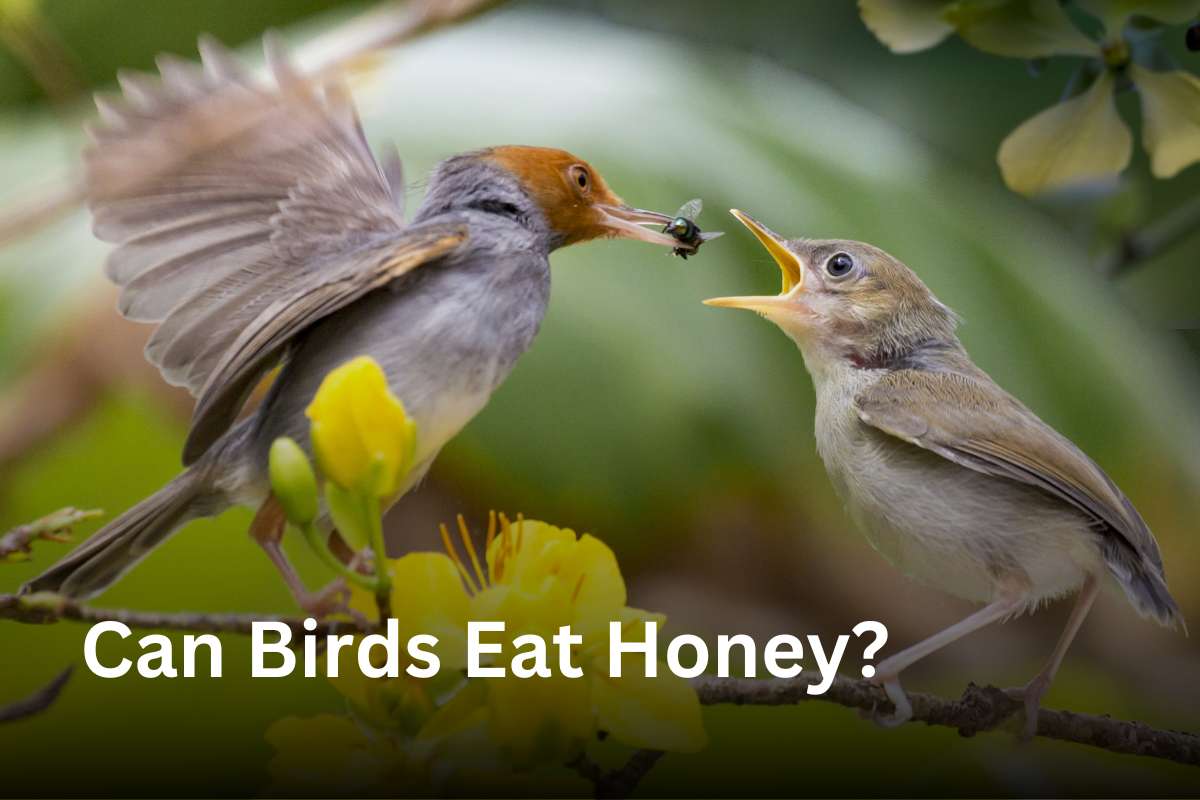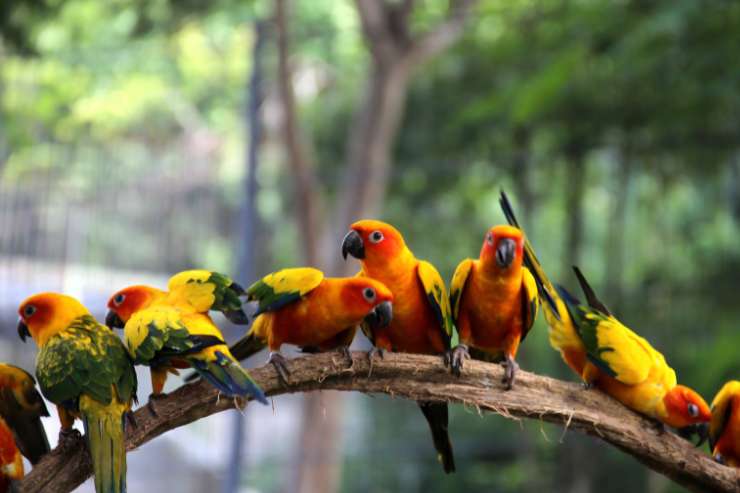Can Birds Eat Honey?

Honey is rich in natural sweetness. It is widely popular among humans for its flavor and health benefits.
The natural sweetness of honey includes fructose and glucose, antioxidants, small amounts of vitamins and minerals, and less content of fat, dietary fiber, and protein.
Birds are fascinating creatures that are recognized for their vibrant colors, melodious songs, and remarkable flight abilities. Understanding birds’ diets and habitat is essential for their conservation.

These charismatic birds are likely to eat a diverse variety of foods that are included in their dietary needs. Such as fruits, vegetables, nuts, and seeds that are nutritionally healthy and beneficial. But all foods are not safe for them.
One of the most intriguing questions is whether can birds eat honey. This natural sweetener is mostly cherished by human beings and is complex for avian birds. The answer is no. Birds cannot eat honey as it contains a high sugar content which is riskier for them.
In this article, we will explore whether honey is safe and beneficial for a bird’s diet. Along with that, we will examine both the potential benefits and risks associated with feeding honey to birds.
Nutritional Benefit of Honey for Birds
Honey is a sweet and viscous substance. It is renowned for its diverse array of nutritional benefits. Here are some of the nutritional benefits of the honey that are helpful for birds:
Quick Source of Energy: As we all know, honey is rich in natural sugars which include fructose and glucose. These types of sugar are the most important source of energy for all organisms.
Antioxidants: Honey includes a variety of antioxidants such as flavonoid acids and phenolic acids. This leads to protecting birds from oxidative stress and assists in maintaining cellular health and reducing inflammation.

Antibacterial and Antifungal Properties: The presence of these antibacterial and antifungal properties in honey aids in healing wounds and prevents bacterial growth. It also includes hydrogen peroxide and low moisture content that helps the birds to combat infections.
Vitamins and Minerals: Honey, a sweet substance, includes small amounts of vitamins and minerals in it. It contains Vitamin C, Calcium, and Iron that help to contribute to the body functioning of a bird’s overall health.
Potential Risks and Concerns of Feeding Honey to Birds
Feeding honey to fascinating birds can pose significant risks and challenges. Some certain potential risks and concerns must be considered while feeding birds:
High Sugar Content: Honey is rich in natural sugars. However, the excessive intake of honey isn’t healthy for birds. Too much consumption of natural sweetness can result in obesity, diabetes, and other metabolic health-related issues.
Risk of Botulism: Botulism is one of the rare and potentially fatal illnesses that is caused by a toxin-producing bacterium Clostridium botulinum. These types of bacteria are commonly found in both soil and water and are very resistant.
Botulism can be fatal to birds. It may occur in several ways. When feathered birds consume honey which is contaminated with Clostridium botulinum spores, it produces a botulinum toxin inside the digestive system of the birds.
The presence of Clostridium botulinum spores can cause birds to die quickly, or in some cases, paralysis may occur.
Allergic Reactions: Birds rarely develop allergic reactions to honey. This may result in respiratory distress or skin irritation.
Acidity: Another potential risk of feeding honey to birds is the Ph level of the honey. Honey has higher acidity levels than nectar.
Due to its acidic nature, it potentially causes discomfort and digestive problems to birds. As a result, it has been disclosed that honey is not good for bird’s health.
Alternatives to Honey
If you are concerned about your feathered bird’s health, then consider these alternatives that are safe and nutritious for birds. Such as
Fresh Fruits: Fresh fruits like apples, grapes, berries, oranges, and raspberries help to provide essential vitamins and minerals to birds.
Vegetables: spinach, broccoli, sweet potatoes, carrots, and peas shall also be included in their diet.
Nuts and Seeds: While feeding nuts and seeds to birds, it is necessary to monitor that it is offered in moderation. As it is rich in protein and healthy fats. Some of them are walnuts, almonds, sunflower seeds, and pumpkin seeds.
Cooked Legumes: These cooked legumes include chickpeas, lentils, and black beans and are a good source of protein and fiber for birds.
Conclusion
In conclusion, most of the birds may include honey in their diet if it is given in moderation. However, being a bird feeder it is essentially important to observe the bird’s diet.
Honey contains several nutritional benefits for humans. But it is more complex for bird’s dietary requirements. The presence of the bacterium Clostridium botulinum can be harmful to birds as it has a high sugar content.
Understanding your bird’s dietary needs and ensuring the health and well-being of birds, it is important to avoid feeding them honey. Apart from feeding honey, feeders can provide fresh fruits, vegetables, herbs, nuts, seeds, and cooked legumes.
Before offering any new food to your feathered bird, it’s important to consult with your avian veterinarian about the bird’s diet.
Frequently Asked Questions
Is raw honey safe for the birds to consume?
No, the birds shall not consume the raw honey. Honey is rich in natural sweetness which increases the risk of botulism by producing a toxin substance by the bacterium Clostridium botulinum. This toxin bacterium weakens the nerve function or may lead to paralysis due to failure of the respiratory system or even cause death if it is not treated immediately.
How to identify the signs of botulism in birds?
Certain signs help bird owners or bird feeders to recognize the early symptoms of botulism in birds. Such as difficulty in breathing, inability to perch or fly, weakness in the nerve function of the bird’s body, and lethargy and unresponsiveness.
Are birds allergic to honey?
The beautiful birds can have allergies to certain components of honey which can result in respiratory distress or skin irritation.
Which birds can eat honey?
Birds like finches, woodpeckers, and hummingbirds can eat honey. For this type of bird, it is essential to offer the honey in moderation.






